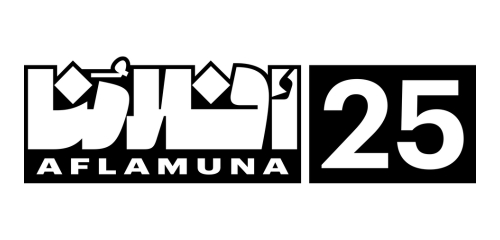
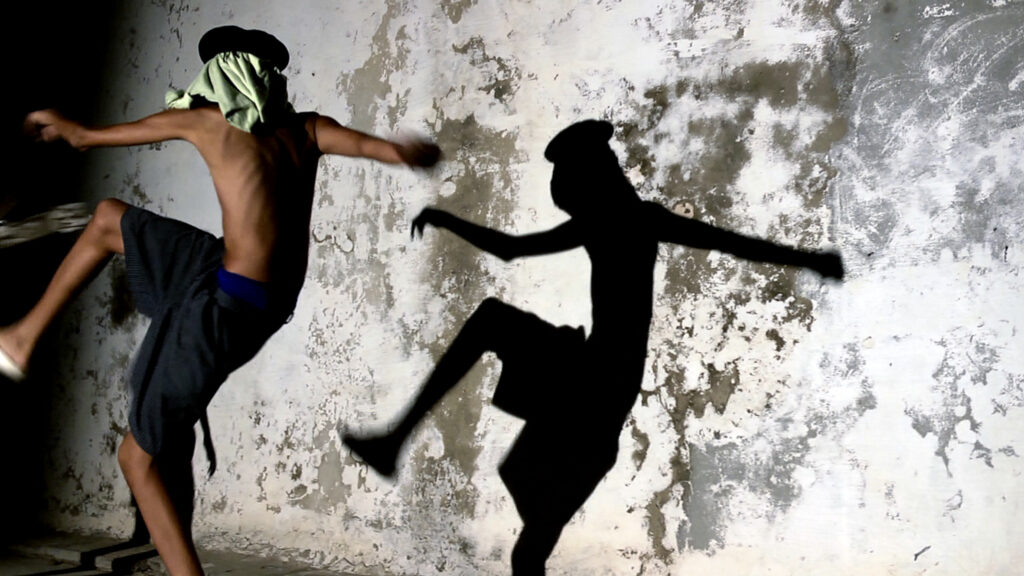
Photo from “Bloody Beans” film, by Narimane Mari.
issue #4 :: June 2024
On the occasion of the Algerian Independence Day on July 5, AFLAMUNA.online is showing the film “Bloody Beans” by Narimane Mari (from June 27th to July 10th). The film tells the story of rebellious children, reveling in fertile imagination, who steal food from a French military base during the fall of the French occupation of Algeria in the face of the National Liberation Movement that ignited the revolution of liberation in 1954.
Many of us will surely be familiar with the revolution of liberation that lasted for seven years and led to independence after about 1 million martyrs lost their lives. That is how the Arabs recognize Algeria, as the country of a million martyrs, but what many ignore is that Algeria has lost these martyrs in only seven years (from the beginning of the revolution until independence on the 5th of July 1962). In fact, some studies that take into account an estimated rate of births and deaths suggest that French colonization of Algeria may have killed between seven and nine million Algerians, from the beginning of the occupation in 1830, in one of the most horrific instances of colonial occupation in the modern era.
At first, France declared Algeria to be French land in 1832, then started wiping off tribes in their entirety, burning the harvest and the trees and the villages, causing a massive famine that resulted in hundreds of thousands of deaths (according to the memoirs of French occupation officers).
That is how, after they tranquilized the situation and made sure to reduce the number of indigenous peoples, they moved on to the next step in the colonial project. They started to invite Europeans of different nationalities to settle in Algeria and, introduced the law known as “Indigenous People Law”, which gave any European settler the right to seize any land they desired, on the condition that they employ Indigenous Algerians and give them only 1/5th of the harvest (the law also barred Algerians from harvesting their land and turned them exclusively into laborers).
The third and concurrent step was the ban on teaching the languages of the indigenous peoples and replacing it with French in an attempt to distort and destroy the country’s culture. They led a campaign of ‘Frenchification’ of the country, branding its indigenous culture as uncivilized. However, the French slogan of liberty, equality, and fraternity only seemed to apply to the European settlers, as indigenous populations were forced into ghettos. (In 1917, the population reached 2,5 million people with the increase of European settlers who constituted in Oran, for example, 70% of the overall residents.)
During the Second World War, France asked Algerians to fight with them in exchange for a promise of independence. The war ended, and the Allies won, but the French broke their promise, and went on to commit a series of horrendous massacres. In 1954, The Revolution of Liberation was declared and perdured until the independence and the expulsion of the colonizers.
Within three months, about a million European settlers fled the country, and only about 40,000 stayed, agreeing to live within the laws and under the authority of the Algerian state. The French colonial project collapsed in Algeria 130 years after it began.
Today, there only remains – after the failure of settler colonial projects in Africa and elsewhere – one active settler colonial project. The Western Zionist project in Palestine. This settler-colonial movement is not different from the settler-colonial projects that came before it in the Americas, Australia, New Zealand, Algeria, South Africa, Kenya, Zimbabwe, Namibia, and elsewhere (some succeeded, and others failed). All of these projects relied on the same playbook: the ethnic cleansing of Indigenous peoples from their land, their manufactured dehumanization and destruction of their culture, and the treatment of what remains of Indigenous populations as second-class citizens (apartheid).
A glance at the Algerian example helps us to better understand the similar path facing Palestine, be it in terms of colonial tactics, or the plight of the indigenous peoples of the land. The zionist project started with genocide and a call for Western settlers to replace the Palestinians, and it was accompanied by the dehumanization of Palestinians, leading to a system of apartheid after coming up short of complete ethnic cleansing, and the imprisonment of Palestinians behind the wall of racial segregation. They are also exploited as cheap labor, cut off from all water and food supply but the ones controlled by the occupation. All the while, the settlement of the land from which they were expulsing or killing Palestinians continues. And all of that is being legitimized by laws the occupation creates for itself to justify its actions. Emulating, play-by-play, the actions of the French in Algeria.
The Palestinians’ struggle mirrors the struggle of the Algerians before them. Is the starvation that colonialism is enforcing in Palestine not the same as the one it enforced in Algeria? “Bloody Beans” takes us back to that period in the history of Algeria and opens our eyes to the not-so-distant memory and its wounds that have not yet healed. The Algerians struggled and resisted for 130 years and achieved liberation which once may have seemed impossible.
“It always seems impossible until it’s done”, once said the late Nelson Mandela.

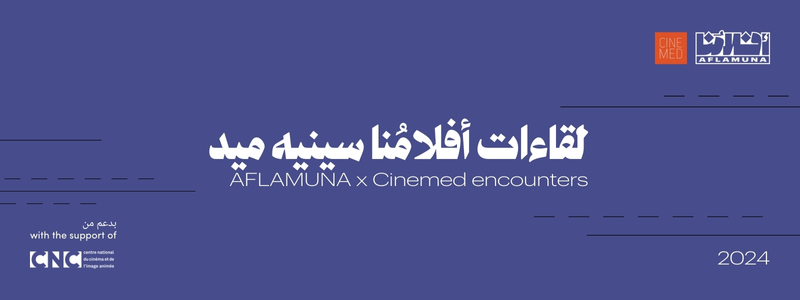
Submissions are now open for the AFLAMUNA x Cinemed encounters 2024.
These encounters offer the opportunity for Arab independent filmmakers and producers working on feature-length films in development to meet with professionals from France and around the globe to build partnerships, collaborations, and co-productions.
submissions deadline: 30/06/2024
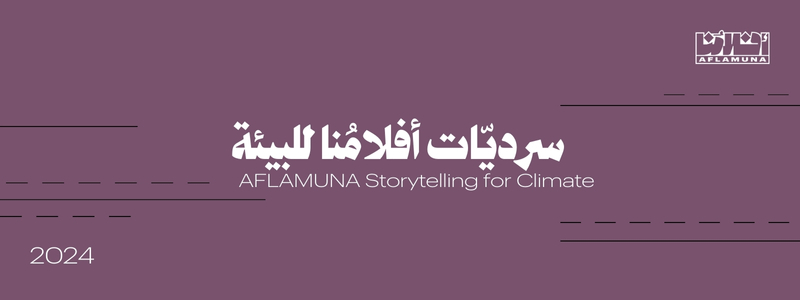
The AFLAMUNA Storytelling for Climate Fund will support the development of these films and accompanying Impact Campaigns. Climate change is an issue that has been overlooked in our region due to the many other crises we also face.
submissions deadline: 15/07/2024
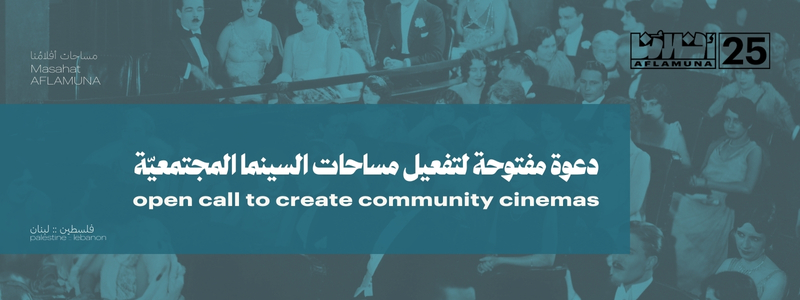
This is an open call for emerging Community Cinema Makers from Lebanon and Palestine to receive training, funding, and access to films, and become the first cohort of the Masahat network.
submissions deadline: 21/07/2024
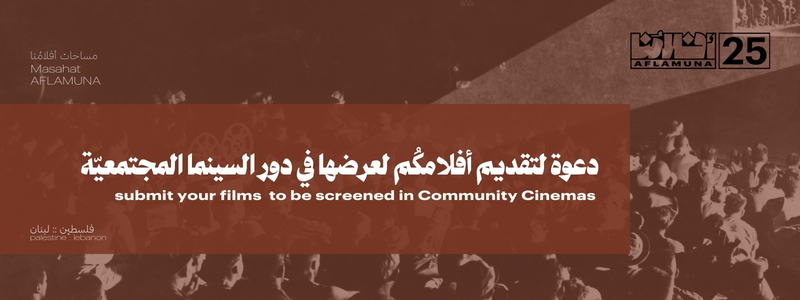
A unique opportunity to showcase your film to diverse audiences in Palestine, Tunisia, and Lebanon. We aim to reach new viewers who may have limited access to theatrical releases or streaming platforms.
submissions deadline: 21/07/2024
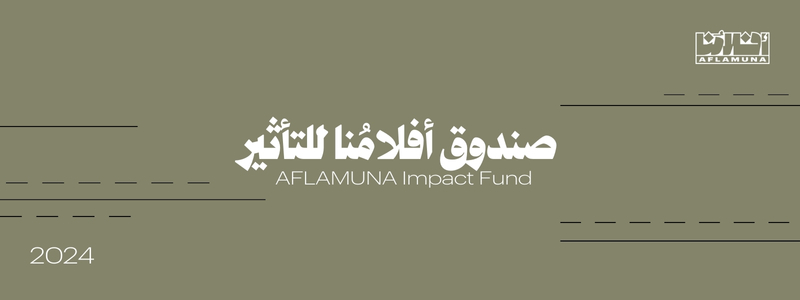
Submissions are now open for the AFLAMUNA Impact Fund, the first of its kind in the Arab region.
This pioneering Fund is dedicated to supporting Impact Campaigns centered around groundbreaking Arab films that tackle the most pressing social, political, and environmental issues of our time, ensuring they reach their rightful audience and spark meaningful change.
submissions deadline: 31/07/2024

Doc SCREENS, Beirut Doc Encounters, will be held in September 2024.
Submissions are now open for Lebanese documentaries to participate.
Deadline to submit: July 14th, 2024
All applications must be submitted online via this entry form.